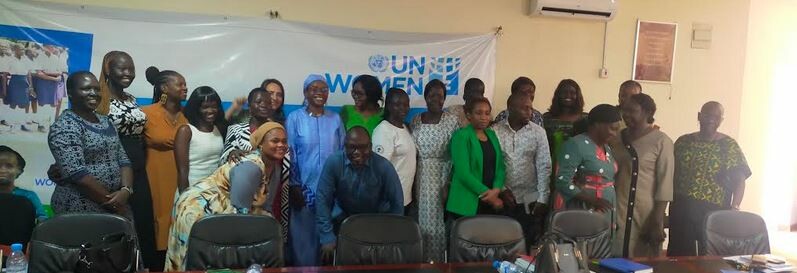South Sudanese women experts on Friday called for collective efforts in fighting gender inequality among South Sudanese and called for closer collaboration between empowered women and men.
Speaking during a Gender Responsive Finance Dialogue panel discussion organized by UN Women in Juba, Awut Mayom, a Rumbek-based entrepreneur, said gender equality requires collective efforts from both men and women because men do not allow their women to work in some circumstances in South Sudan yet what they provide is inadequate to run the family.
“As we engage further in empowering women, we also need to involve men in this action so that they can support the women to be financially independent,” she said. “Women are now dependent on their men who are breadwinners and that dependency is causing a lot of troubles in the house. The man is the only one bringing everything in the house and if a woman complains about some issues then the man will begin to question her.”
Awut said men need to understand that they should accept to put up with empowered women.
“However much we empower women and men are not accepting to live with them, it is not going to be helpful, they have to accept to live with empowered women so that we produce healthy communities,” she stressed.
For her part, Jane Tumalu Erasto, Assistant Director for Gender Mainstreaming in the Ministry of Gender, Child and Social Welfare, warned that achieving gender equality in South Sudan will take longer than expected as literacy levels among women in South Sudan remain very low.
“Gender equality is achievable in South Sudan but not very soon because we have a lot of work to do. When I read the report of our first South Sudan National Action Plan they said that the education level of women is 19.1 percent so we need to educate the women so that we achieve gender equality.”
She added: “The level of education is very low and even the level of knowledge about gender is very low even those who are educated and working in the government decision-making levels do not know about gender, they say when we talk about gender that refers to competing with men and sometimes they are saying that we are taking over from them.”
Meanwhile, Rukaya Mohammed, Deputy Country Representative of UN Women in South Sudan, said more than 100 million women and girls could break free from the shackles of poverty if the government prioritizes crucial factors like education, family planning, fair wages and bolstering social support system
She said poverty has increased in South Sudan in recent years mainly because of protracted conflict and a decline in oil prices.
“As in most countries, in South Sudan, women and girls have been the most vulnerable; the inclusion of women and groups with low bargaining power with low access to productive resources in poverty-reduction programs in South Sudan can tackle specific vulnerabilities and solidify efforts to promote gender equality,” she explained. “On the other hand failing to recognize existing gaps can exacerbate inequality to the detriment of vulnerable subgroups and further exacerbate the country`s overall fragility.”




